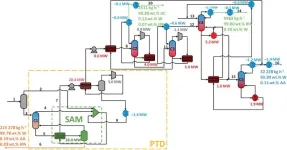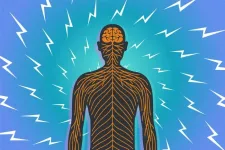(Press-News.org) In a new study, 38 percent of dog owners surveyed in Denmark reported giving their pups cannabinoids, particularly cannabidiol or CBD. Pernille Holst and colleagues at the University of Copenhagen, Denmark present these findings in the open-access journal PLOS ONE on January 31.
Cannabis has become popular for recreational and medical use in humans, and many cannabis-based products are also available for pets. But because cannabis is not legal for veterinary use in countries such as Denmark, pet owners are using it without a prescription. To understand how common unlicensed cannabinoid use for pets is in Denmark, Holst and colleagues distributed an anonymous survey on social media. Dog owners self-reported whether they used cannabinoids for their pets, what types they used and for what purpose, and whether the pet owners felt the drugs were effective.
Of the 2,002 owners who completed the survey, 752 (38 percent) reported using at least one cannabinoid product for their pet. Among the dog owners who gave their dogs cannabinoids, 93 percent used CBD drops or oils, and nine percent used CBD ointments or creams. Only four percent of owners reported using products containing THC (delta-9-tetrahydrocannabinol). Pet owners most often reported using the drugs for their dogs’ pain, behavioral issues and allergies, though they also reported using cannabinoids for their animal’s wellbeing, cancer, seizures, appetite or other conditions. 77 percent of these respondents believed they saw at least some positive effect of the drugs in their dogs.
The research establishes that despite their unlicensed state, some Danish dog owners do use cannabinoids in dogs, and that most who do believe it has a positive effect on their dogs mental or physical health. However, the authors note that these findings are not supported by current studies investigating behavioral modification in dogs after CBD treatment, and that placebo effects potentially exist in the owners’ evaluations. While the results are self-reported, they emphasize the need for more evidence-based studies of cannabinoid use in pets.
The authors add: “One of the findings that surprised us was the diverse range of medical and behavioral conditions in their dogs for which Danish dog owners utilized cannabinoid products and how well the owners perceived the effect of the treatment. This suggests that systematic clinical studies are warranted within cannabinoid use in pet dogs.”
#####
In your coverage please use this URL to provide access to the freely available article in PLOS ONE: https://journals.plos.org/plosone/article?id=10.1371/journal.pone.0296698
Citation: Holst P, Kristensen AT, Arendt ML (2024) Danish dog owners’ use and the perceived effect of unlicensed cannabis products in dogs. PLoS ONE 19(1): e0296698. https://doi.org/10.1371/journal.pone.0296698
Author Countries: Denmark
Funding: The authors received no specific funding for this work.
END
38% of surveyed Danish owners put their dogs on unlicensed cannabinoids
Owners feel using cannabis or cannabidiol helps treat pups’ pain, behavioral issues, and allergies
2024-01-31
ELSE PRESS RELEASES FROM THIS DATE:
After big shocks such as the pandemic lockdowns and the invasion of Ukraine, happiness levels may return to normal in as little as 2-3 weeks, per sentiment analysis of tweets in ten countries
2024-01-31
After big shocks such as the pandemic lockdowns and the invasion of Ukraine, happiness levels may return to normal in as little as 2-3 weeks, per sentiment analysis of tweets in ten countries
###
Article URL: https://journals.plos.org/plosone/article?id=10.1371/journal.pone.0295896
Article Title: Reactions to macro-level shocks and re-examination of adaptation theory using Big Data
Author Countries: South Africa, New Zealand
Funding: The authors received no specific funding for this work. END ...
Non-invasive wearable devices might be able to predict preterm birth by monitoring changes in maternal heart rate variability
2024-01-31
Non-invasive wearable devices might be able to predict preterm birth by monitoring changes in maternal heart rate variability
###
Article URL: https://journals.plos.org/plosone/article?id=10.1371/journal.pone.0295899
Article Title: Wearable-derived maternal heart rate variability as a novel digital biomarker of preterm birth
Author Countries: USA
Funding: The authors received no specific funding for this work. END ...
Childhood vitamin D deficiency was likely prevalent during industrialization in England
2024-01-31
Evidence from teeth reveals that vitamin D deficiency during childhood was likely a major issue in industrialized England, according to a study published January 31, 2024 in the open-access journal PLOS ONE by Anne Marie Snoddy of the University of Otago, New Zealand and colleagues.
The 18th and 19th centuries AD were a period of industrialization and urbanization in England. This was also a time of increasing incidence of health issues like vitamin D deficiency (VDD) and associated conditions like rickets, potentially linked to changing social practices ...
Archaeological evidence of seasonal vitamin D deficiency discovered
2024-01-31
Rickets ran rife in children following the Industrial Revolution, but University of Otago-led research has found factory work and polluted cities aren’t entirely to blame for the period’s vitamin D deficiencies.
In a Marsden funded study, just published in PLOS One, researchers from Otago, Durham University, University of Edinburgh, University of Brighton, and University of Queensland, sampled teeth from a cemetery site in industrial era England, looking for microscopic markers of nutritional disease.
Lead author Dr Annie Sohler-Snoddy, Research ...
Jennifer J. Raab named President and CEO of The New York Stem Cell Foundation
2024-01-31
NEW YORK, NY (January 31, 2024) – The New York Stem Cell Foundation (NYSCF) announced today that, following a nationwide search, its Board of Directors has named Hunter College President Emerita Jennifer J. Raab as its next President and Chief Executive Officer, effective this month.
NYSCF is one of the world’s leading nonprofit stem cell organizations, raising and investing more than $450 million since its founding in 2005 to accelerate cures for the major diseases of our time through stem cell research. The foundation conducts its own pioneering research at the NYSCF Research Institute laboratories in Manhattan, informs and convenes scientists and ...
A new way to visualize brain cancer
2024-01-31
Brigham and MIT researchers uncovered never-before-seen details in human brain tissue with new, inexpensive microscopy technology.
KEY TAKEAWAYS
Researchers have developed a new microscopy technology called decrowding expansion pathology (dExPath) to analyze brain tissue.
By pulling proteins apart with dExPath, researchers can stain proteins in tissue that could not be accessed before, highlighting nanometer sized structures or even cell populations that were previously hidden.
This “super-resolution imaging” technology ...
AI can predict brain cancer patients’ survival
2024-01-31
Artificial Intelligence (AI) can predict whether adult patients with brain cancer will survive more than eight months after receiving radiotherapy treatment.
The use of the AI to successfully predict patient outcomes would allow clinicians to be better informed for planning the next stage of treatment and refer patients to potentially life-saving treatment quicker.
This is the first use of AI to predict short-term and long-term survivors within eight-months of radiotherapy.
The paper published recently in Neuro-Oncology shows how researchers ...
Fermentation revolution? Trash becomes treasure as bio-waste yields valuable acetone and isopropanol
2024-01-31
In a major stride towards sustainable industrial fermentation, a team of researchers at Delft University of Technology (TU Delft) in The Netherlands, has unveiled pioneering advancements in the purification of isopropanol and acetone from the fermentation of waste gases. The study, published in SCI's Journal of Chemical Technology and Biotechnology, introduces novel processes that promise to elevate the efficiency and viability of large-scale production.
Isopropanol and acetone have a combined global market of $10 billion. Both chemicals are important industry solvents and isopropanol ...
The hottest catalog of the year: the most comprehensive list of slow-building solar flares yet
2024-01-31
Solar flares occur when magnetic energy builds up in the Sun’s atmosphere and is released as electromagnetic radiation. Lasting anywhere from a few minutes to a few hours, flares usually reach temperatures around 10 million degrees Kelvin. Because of their intense electromagnetic energy, solar flares can cause disruptions in radio communications, Earth-orbiting satellites and even result in blackouts.
Although flares have been classified based on the amount of energy they emit at their peak, there has not been significant study into differentiating ...
Researchers uncover potential non-opioid treatment for chronic pain
2024-01-31
Among the most difficult types of pain to alleviate is neuropathic pain, pain that is usually caused by damage to nerves in various body tissues, including skin, muscle and joints. It can cause patients to suffer feelings like electric shocks, tingling, burning or stabbing. Diabetes, multiple sclerosis, chemotherapy drugs, injuries and amputations have all been associated with neuropathic pain, which is often chronic, sometimes unrelenting and affects millions of people worldwide. Many of the available pain medications are only moderately effective at treating this type of pain and often come with serious ...
LAST 30 PRESS RELEASES:
Natural selection operates on multiple levels, comprehensive review of scientific studies shows
Developing a national research program on liquid metals for fusion
AI-powered ECG could help guide lifelong heart monitoring for patients with repaired tetralogy of fallot
Global shark bites return to average in 2025, with a smaller proportion in the United States
Millions are unaware of heart risks that don’t start in the heart
What freezing plants in blocks of ice can tell us about the future of Svalbard’s plant communities
A new vascularized tissueoid-on-a-chip model for liver regeneration and transplant rejection
Augmented reality menus may help restaurants attract more customers, improve brand perceptions
Power grids to epidemics: study shows small patterns trigger systemic failures
Computational insights into the interactions of andrographolide derivative SRJ09 with histone deacetylase for the management of beta thalassemia
A genetic brake that forms our muscles
CHEST announces first class of certified critical care advanced practice providers awarded CCAPP Designation
Jeonbuk National University researchers develop an innovative prussian-blue based electrode for effective and efficient cesium removal
Self-organization of cell-sized chiral rotating actin rings driven by a chiral myosin
Report: US history polarizes generations, but has potential to unite
Tiny bubbles, big breakthrough: Cracking cancer’s “fortress”
A biological material that becomes stronger when wet could replace plastics
Glacial feast: Seals caught closer to glaciers had fuller stomachs
Get the picture? High-tech, low-cost lens focuses on global consumer markets
Antimicrobial resistance in foodborne bacteria remains a public health concern in Europe
Safer batteries for storing energy at massive scale
How can you rescue a “kidnapped” robot? A new AI system helps the robot regain its sense of location in dynamic, ever-changing environments
Brainwaves of mothers and children synchronize when playing together – even in an acquired language
A holiday to better recovery
Cal Poly’s fifth Climate Solutions Now conference to take place Feb. 23-27
Mask-wearing during COVID-19 linked to reduced air pollution–triggered heart attack risk in Japan
Achieving cross-coupling reactions of fatty amide reduction radicals via iridium-photorelay catalysis and other strategies
Shorter may be sweeter: Study finds 15-second health ads can curb junk food cravings
Family relationships identified in Stone Age graves on Gotland
Effectiveness of exercise to ease osteoarthritis symptoms likely minimal and transient
[Press-News.org] 38% of surveyed Danish owners put their dogs on unlicensed cannabinoidsOwners feel using cannabis or cannabidiol helps treat pups’ pain, behavioral issues, and allergies







